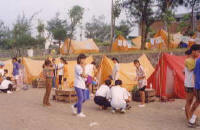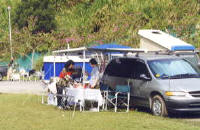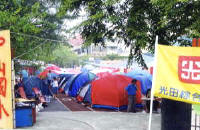Camping in Taiwan
The History of the Camping in Taiwan / The Creation of a New Camping Culture

The modern era of Taiwan refers to the period of time starting in 1949 until now. In 1949, the government of the Republic of China (ROC), ruled by the Kuomintang (KMT) party, moved its seat from the mainland of China to the island of Taiwan. For about past 50 years in its rule, KMT government enforced "the Temporal Provision Effective during the Period of Communist Rebellion"(1948 - 1987) which, like the martial law, suspended some civil rights and freedoms specified in the Constitution. For example, freedoms of assembly and association were restricted to a great extent. Consequently, it had been difficult to get approval from the authority to form the associations, including those centering on the outdoor activities. However, the youth organizations under the firm control of the KMT government, such as Boy Scouts of China and Chinese Youth Corps, were the exception. It is in such a particular background of political history that an unique camping culture of Taiwan has been developed.
A List of the Brief History of the Organized Camping of the Modern Taiwan
- 1945/10/10 Y. M. C. A. was established in Taipei, Taiwan.
- 1949/04/18 KMT government enacted "the Temporal Provision Effective during the Period of Communist Rebellion."
- 1949/10 Y. W. C. A. was established in Taipei, Taiwan.
- 1949/12/07 KMT government moved its seat from the mainland China to the island Taiwan
- 1950/02 The General Association of Boy Scouts of China was reestablished in Taipei, Taiwan.
- 1950/07 Taipei's Y. M. C. A conducted the First Camping for Kids at Kuei-San in Taipei County.
- 1951/08 Taipei's Y. W. C. A conducted the First Camping for Adolescents at Chih-Cheh in Taipei County. This type of camping was conducted for 3 consecutive years and then stopped.
- 1951/12 The Ministry of Education announced "the Guideline for Scouting Education in the middle schools." "Scouting Education" was officially integrated into the curriculum of the middle schools. The course "Scouting Education" was offered one hour per week.
- 1952/10/14 4-H Club was established at Cha-Yi Agricultural and Industrial High School.
- 1952/10/31 The Chinese Anti-Communist and Country-Saving Youth Corps (The Chinese Youth Corps) was established in Taipei.
- 1952/11 The Scouting Society of China was reestablished in Taipei.
- 1953/07 Boy Scouts of China conducted the first summer camp at Ali-San.
- 1953/07 The Chinese Youth Corps conducted the first "summer combat camp." The camp was divided into 8 groups in the total of 8,365 participants. Later on, this type of camp was also conducted in winter. The number of the participants of the combat camp exceeded one million since 1975, and started to decline in 1992. For now, it is about 200 thousands.
- 1955/09 The Provincial Taiwan Normal University established a "Specialized Program for Scouting Education" to cultivate teachers to teach "Scouting Education" in the middle schools.
- 1955/10 Taipei's Y. M. C. A created the first permanent campsite at Fu-Long.
- 1958/10 Taipei's Y. M. C. A created the second permanent campsite at Tou-Chen.
- 1960/06 The Chinese Youth Corps established a permanent campsite at Chin- San.
- 1960/08 The General Association of Boy Scouts of China established the "Forest Park Campground."
- 1968/09 The Ministry of Education carried out the nine-years' compulsory education.
- 1974/07 The Camping International Company, Ltd. established the first privately-run campground at Pin-Lin in Taipei County.
- 1975/10/18 The Camping Association of the Republic of China was established.
- 1976/08/02 The Camping Association of the Republic of China became a member of F. I. C. C..
- 1979/11 The Camping Association of the Republic of China conducted the First Family Camping Rally. The rally was held annually in the following yeas until it stopped in 1996.
- 1981/02 The Scouting Society of China began to publish "Essays on Scouting Education" annually until 1998.
- 1985/02 Boy Scouts of China initiated a "special project for strengthening Scout Movement" in order to promote Scout Movement in the communities.
- 1987/07/05 "The Temporal Provision Effective during the Period of Communist Rebellion" was claimed ineffective. A new law regulating the civil organizations was made.
- 1990/07/28 The Executive Yuan intended to "strengthen Scouting Education" and requested the Ministry of Education to propose a three-year plan.
- 1991/06/09 The Federation Camping and Caravanning of the R.O.C.
- 1994/09 "The Three-year Plan for Strengthening Scouting Education" was put into practice. All middle schools were financed to improve their equipment and activities in relation to Scouting Education. Some middle schools were granted to establish "campgrounds at the school yards."
- 1997/02 The Society of Environmental Education of the R. O. C. was established.
- 1998/05/20 The Recreation Vehicle Association of Taiwan was established.
The Development of Camping Activity in Modern Taiwan
The development of camping activity in the modern Taiwan can be divided into three main developmental periods as follows:
1. Period of Education / Training Camping (1950 - 1970);
2. Period of Group / Recreation Camping (1971 - 1987);
3. Period of Leisure / Family Camping (1988 - now).
More descriptions about the above-mentioned three main developmental periods of camping in modern Taiwan are as follows:
1. Period of Education / Training Camping (1950 - 1970)
Soon after the KMT government moved its seat from mainland China to island Taiwan, many mainland-based associations in relation to camping were reestablished in Taiwan. One thing deserving special attention was the continuity of the "Scouting Education" class, offered one hour per week for three years in the middle schools. The "Scouting Education" class as a required subject in the middle schools on Taiwan seems to be very unique case in terms of the middle curriculum all over the world. Due to the establishment of the Scouting Education class, all middle schools are requested to conduct camping activity every year. The feature of the school camping at this period was mostly for educational and training purposes. However, there were not decent campgrounds in Taiwan. Many primitive areas, such as the river banks and places near reservoir, were chosen as the sites for school camping. Under the direction of school teachers, students picked up the dead boughs to make a fire, and drank the water drawn out from rivers, and made camp construction by using natural materials. Therefore, the Period of Education / Training Camping is also called the "Period of Camping in Utilizing the Natural Environment."
2. Period of Group / Recreation Camping (1971 - 1987)

The years around 1970 witnessed extensive social changes in Taiwan. In 1968, the compulsory education extended from six years to nine years. In 1970s, the school entrance examinations become so competitive that "Scouting Education" received less attention than ever before. In 1971 , the Republic of China lost its seat in the United Nations. The government changed the "recovery of mainland" policy and became active in constructions of Taiwan.
In 1974, "Ten National Construction Projects" were initiated. The projects resulted in the economic growth, the formation of industrial society, the increase of personal incomes, and the reduction of working time, etc. Many workers of the companies and factories began to go outdoors. During this period of time, the Chinese Youth Corps expanded its business by organizing various kinds of "self-strengthening" activities for public and private institutions with the total participating number of more than 1.1 million per year. However, the Chinese Youth Corps did the business without license and was regarded as one of the biggest illegal travel agent in the world.
On the other hand, more and more people went camping without the direction of the school teachers and specialized scouting leaders. They did many improper things, including making a fire without permission, pouring the leftover into rivers, sitting up and playing all night by the campfire without knowing the meaning of the campfire, and making themselves exhaustive in the other day. Therefore, the Period of Group / Recreation Camping is also called the "Period of Camping in Misusing the Natural Environment."
3. Period of Leisure / Family Camping (1988 - now)

The years around 1987 witnessed another drastic change in Taiwan. First of all, "The Temporal Provision Effective during the Period of Communist Rebellion" was claimed ineffective after its enforcement of about 40 years. Citizens are allowed more freedom of association and assembly. In 1988, GNP per capita was over US$ 6,000. Taiwan was then recognized by the World Bank as one of high income countries. The total working time was reduced to the level of less than 2,300 hrs per year. The growth rate of the private cars exceeded 16% per year. All these factors conduced to the arrival of the period of automobile / family camping.
On the other hand, the adolescent problems become more and more serious due to rapid social changes. The Executive Yuan again requests the Ministry of Education to propose another "Three-Years Plan of Strengthening Scouting Education." It seems that Scouting Education may revitalize after years of being ignored.
In addition, the environmental problems become acute along with the economic miracle in Taiwan. The policy of economic growth at the expense of environmental quality has criticized. As more and more people are aware of the consequences of environmental pollution, the Ministry of Education decided to integrate the environmental education into the school curriculum. Therefore, the Period of Leisure / Family Camping is also called "the Period of Camping with Emphasis on Environmental Education."
The Prospect of Camping in the Twenty-first Century

The development of modern Taiwan camping goes through three main periods:the Period of Education / Training Camping (1950 - 1970), the Period of Group / Recreation Camping (1971 - 1987), and the Period of Leisure / Family Camping (1988 - now). The trend has been recessive in terms of the organized camping. Particularly after 1980s, with the emergence of multi-society, camping is no more the only choice for the adolescent to enjoy outdoors. However, camping as a skill or a method of education is still important.
The big earthquake in the central part of Taiwan in September 21 last year reminds us that camping is the emergent measure of accommodation between the period of the destruction of the residence and the establishment of the shelters. It is estimated that more than 400 thousand people become homeless. However, more than 100 thousand tents were donated and delivered to the disaster area within less than a week. The relative ease of the impact of the earthquake and the effective mobilization for rescue can be fairly attributed to the function of "Scouting Education" taught for the last 50 years in the middle schools in Taiwan. The reasons are that the citizens have learned the basic skill in outdoor living from "Scouting Education," and the schools in Taiwan have plenty of tents in stock for instructional purpose.
In the face of the drastic social changes and unpredictable natural environment, particularly those countries locating around the earthquake zone, such as Taiwan, Japan, Philippines, and Indonesia, it is highly recommended that both camping education and camping equipment should be strengthened.
- Past, Present and Future of the Camping
- The History of the Camping in Taiwan
- The Snow Cave














